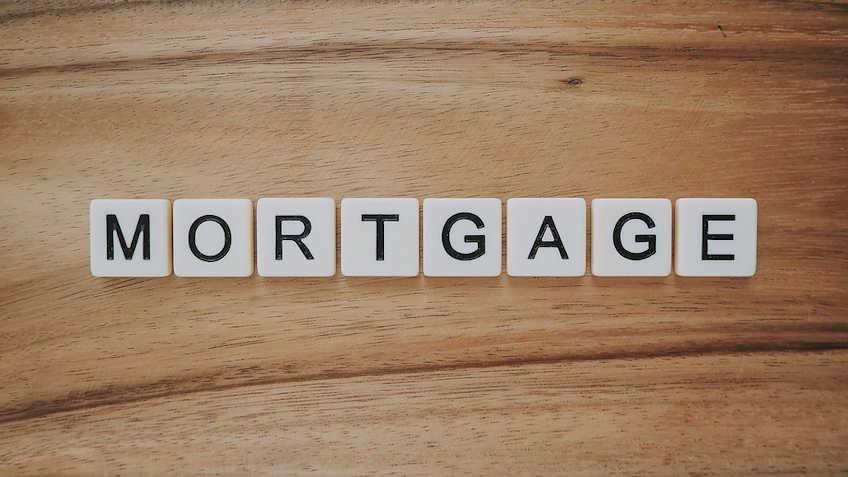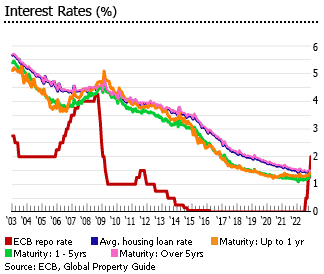If you are still intrigued to know more about Interest Rates in France Mortgage, feel free to check previous data and information about the property and all the services they have been providing over the past years, so keep on reading…..
If you are considering purchasing a property in France, the current mortgage interest rates are certainly something to keep an eye on. In 2023, interest rates continue to fluctuate and can have a significant impact on your homebuying journey. Whether you are looking for a fixed-rate or adjustable-rate mortgage, understanding the current market trends and where rates stand is key. In this blog post, we will explore the current French mortgage interest rates in 2023 and what factors could affect them in the future.

Source : www.longtermrentalsinfrance.com
1. French new housing loans interest rates in January 2023
French new housing loan interest rates in January 2023 have seen a slight increase compared to the previous year. The effective rate in the narrow sense, which excludes fees and insurance, stands at 2.36%. According to Better rates.com, the best mortgage rates as of April 08, 2023 are at 2.79%.
The interest rates for French mortgage loans in different categories of borrowers vary depending on the duration of the loan. January 2023 mortgage rates are up in a range ranging from 0.15 to 0.42. However, Charles Hamer Financial Services offers mortgage arrangement fees to help individuals negotiate a better loan rate.
French residents seeking to buy primary or holiday homes, buy-to-lets, or refinance their homes may also see differences in mortgage interest rates.
Predictions for French housing loan interest rates in 2023 vary. Trading Economics’ outlook for French housing loan interest rates in 2023 forecasts a slight increase, while historical comparison data from the previous year shows an overall upward trend.
It is worth noting that French average mortgage rates have been the lowest in the eurozone as of November 2022, and an usury rate agreement has been made between the finance minister and the Bank of France governor.
Overall, individuals seeking a new housing loan in France in January 2023 may encounter slightly higher interest rates compared to the previous year, but with the help of mortgage arrangement fees and careful negotiation, a favorable rate may still be attainable.

2. Increase in French housing loan interest rates from the previous year
The French housing market has seen a significant increase in interest rates for mortgage loans. As of January 2023, new housing loans had an average interest rate of 2.2 percent, which is about twice higher than the previous year. This increase is causing concern amongst buyers who are looking to finance their property purchases.
According to experts, the upward trend is set to continue with rates soon reaching 3.5% and some predicting that they will pass the 4% mark before the end of 2023. French banks are continuing to raise interest rates on mortgage loans in response to rising inflation and increased borrowing costs.
Despite this increase, the French government has implemented measures to support homebuyers. The composite cost-of-borrowing indicator for households for house purchase fell to a historical low of 1.3% in September 2021 and has remained largely unchanged. Additionally, Charles Hamer Financial Services is offering competitive mortgage arrangement fees to help offset the rising interest rates.
The outlook for French housing loan interest rates in 2023 is mixed. While rates are projected to decrease slightly, they are unlikely to return to the rock-bottom levels of 2020 and 2021. However, the French average mortgage rates remain the lowest in the Eurozone.
It is important for buyers to consider the differences in mortgage interest rates for French resident buyers of primary and holiday homes, buy-to-lets, and refinancing, before committing to a loan. Furthermore, a usury rate agreement between the French finance minister and Bank of France governor ensures that rates cannot reach unreasonable levels, providing some degree of security for buyers.

3. Average interest rates for French mortgage loans in different categories of borrowers
According to recent data, average interest rates for French mortgage loans varied across different categories of borrowers in January 2023. New housing loans had an average interest rate of 2.2%, which is about twice as high as the previous year. Fixed-rate loans with 100% financing for a 15-year term had an interest rate of 3.05%, while those with 20-year terms had interest rates of 3.30%. Borrowers with 90% financing for a 15-year term had an interest rate of 2.75%.
Despite the increase in interest rates, Charles Hamer Financial Services still offers competitive mortgage arrangement fees. Furthermore, French mortgage rates are still among the lowest in the eurozone, as reported in November 2022. However, predictions suggest that interest rates will continue to rise in 2023 with fluctuations due to changes in the country’s ratesetter-in-chief and other economic factors.
The growth rate of outstanding home loans in February 2023 was 4.8%, and the growth rate of consumer loans increased slightly to 4.0%. This indicates that borrowing is still relatively high in France, despite the rising interest rates.
Additionally, the recent agreement between the French finance minister and the Bank of France governor has resulted in an increased usury rate of 3.05 for a loan of up to €75,000, effective from October 1, 2022. It is predicted to increase further in February 2023.
Overall, obtaining a French mortgage in 2023 may be more costly than in previous years, but there are still opportunities to secure competitive rates with the help of specialized financial services.
4. Predictions for French housing loan interest rates in 2023
According to brokers, the trend for real estate rates in France in 2023 is on the rise. The ever-increasing cost of money is expected to push interest rates on mortgages above 3% in the course of the year. Brokers anticipate interest rates around 3.50% during the summer and 4% for the end of 2023.
The average mortgage rate (excluding guarantees and insurance) was 2.34% in December 2022, but after a revaluation in February and March, the new increase, from April 1, 2023, will make mortgages more accessible. The average nominal rate for mortgages has gone up by 1.10% over 20 years to 2.5% in December.
It is predicted that the high point of real estate rates in France, which was in 2008 at more than 5%, is gradually falling to stand at around 1.07% before the start of 2022. However, real estate rates have started to rise since January 2022 and reached 1.88% in October. With an average rate of 2.80% for a 20-year loan, France is moving away from the low values of 2022 to approach the predicted rates for 2023.
While there may be a temporary measure in place until July 2023, the attrition rate of 3.53% for fixed rate loans with a lower duration has been skewed higher than usual. The differences in mortgage interest rates for French resident buyers of primary and holiday homes, buy-to-lets, and refinancing are likely to continue.
Charles Hamer Financial Services’ mortgage arrangement fees are expected to remain constant, and French average mortgage rates are still the lowest in the eurozone as of November 2022. An usury rate agreement between the French finance minister and Bank of France governor could affect predictions for French housing loan interest rates in 2023. However, based on the available data and analysis, it seems likely that rates will continue to rise.
5. Trading Economics’ outlook for French housing loan interest rates in 2023
According to Trading Economics, French housing loan interest rates are expected to rise in 2023. The forecast predicts that the rates will reach around 3.0% by the end of the year. This follows the upward trend that has been observed since the beginning of 2023, with rates soon set to reach 3.5% and experts predicting that they will pass the 4% mark this year.
The projections for French housing loan interest rates in 2023 include real GDP, the HICP, a short-term interest rate, and housing loans as control variables. These variables will be estimated for the period running from the beginning of the year until the end of 2023.
Assuming the rate reaches 2.75% at the end of 2022, the affordability ratio in France is expected to remain very good, with 30% of large cities and 60% of other areas being within the range of affordability.
The historical comparison of French mortgage interest rates shows a downward trend prior to the recent tightening cycle. Lower rates led to an increase in housing demand in the country, and some homeowners took advantage of the open window to refinance their mortgages.
Trading Economics’ outlook implies that French residents looking to purchase primary and holiday homes, buy-to-lets, or refinance their existing mortgages may face higher interest rates in the coming months. As a result, the cost of borrowing in France is expected to rise, which could make it more challenging for some borrowers to purchase a home.
Overall, the Trading Economics report highlights the expected rise in French housing loan interest rates in 2023, with predictions of rates rising to 3.0% or above by the end of the year. This information is important for residents of France who are considering buying, refinancing or investing in the country’s real estate market.
6. Historical comparison of French mortgage interest rates from the previous year
Taking a look back at the previous year’s data, it can be seen that French mortgage interest rates have indeed been on the rise. In January 2022, the average interest rate for French mortgage loans was 1.35%. This increased to 2.59% in January 2023, marking a stark increase from the previous year.
Throughout 2022, mortgage interest rates slowly increased every month, before seeing a sharp rise at the start of 2023. As of February 7, 2023, the average rate for all durations combined was 2.20%, according to estimates by an institution.
However, it is worth noting that despite this increase, French mortgage rates remain the lowest in the Eurozone, as evidenced by November 2022 data.
Looking ahead, predictions for French housing loan interest rates in 2023 are uncertain. While Trading Economics’ outlook expects rates to continue rising, the recent Usury rate agreement between the French finance minister and Bank of France governor may offer some relief for borrowers.
Overall, understanding the historical comparison of French mortgage interest rates from the previous year can provide insight for borrowers looking to make the most informed decision when it comes to borrowing at the right time and with the lowest possible interest rate.
7. Differences in mortgage interest rates for French resident buyers of primary and holiday homes, buy-to-lets, and refinancing
French resident buyers looking to invest in primary homes, holiday homes, buy-to-lets or refinance their existing mortgage face varying interest rates, depending on their category. In January 2023, new housing loans had an average interest rate of 2.2 percent, up from the previous year.
For primary home buyers, interest rates ranged from 2.80% to 3.10%, with loan-to-value (LTV) ratios up to 80%, depending on the financial institution. Meanwhile, interest rates for holiday home buyers, buy-to-let investors, and refinancers ranged from 3.10% to 3.6%, with LTV ratios between 70% and 80%.
The high demand for rural properties and rising interest rates, coupled with tighter mortgage criteria, has pushed up property prices, contributing to a difficult market for buyers.
Charles Hamer Financial Services, however, provides bespoke mortgages from private banks and alternative lenders, offering customers a more flexible arrangement with varying interest rates.
In November 2022, French mortgage interest rates were the lowest in the eurozone, contributing to France’s reputation as a popular investment destination among international buyers. However, borrowers should be mindful that when refinancing their mortgage, closing costs can range from 2% to 5% of the loan amount, based on the lender.
The recent usury rate agreement between the French finance minister and the Bank of France governor has also helped to keep mortgage rates in check, protecting borrowers from excessive interest rates from financial institutions.
Overall, French resident buyers have a wide range of interest rates to choose from, depending on their mortgage category and financial institution. However, with rising interest rates and increasing property prices, careful financial planning and mortgage arrangement are vital to secure a good investment.

8. Charles Hamer Financial Services’ mortgage arrangement fees
French mortgage broker Charles Hamer Financial Services has recently released their mortgage arrangement fees for 2023. The fees, which cover the cost of arranging a mortgage on behalf of a client, are set to remain competitive and reasonable.
As seen in Section 1, French new housing loan interest rates in January 2023 are subject to change, and borrowers should expect a small increase from the previous year (Section 2). However, with Charles Hamer Financial Services’ mortgage arrangement fees remaining affordable, borrowers can still benefit from competitive rates.
The fees apply to all categories of borrowers, from first-time home buyers to those seeking to refinance their existing mortgages (Section 3). Predictions for the housing loan interest rates in 2023 (Section 4) are uncertain, but Charles Hamer Financial Services remains committed to providing transparent and competitive fees.
Trading Economics, a well-known financial analysis firm, offers an outlook on French housing loan interest rates in 2023 (Section 5) that further highlights the importance of competitive mortgage arrangement fees. Historical data (Section 6) also shows that French mortgage interest rates vary according to the larger economic landscape, emphasizing the importance of careful financial planning.
It is worth noting that there are differences in mortgage interest rates for French resident buyers of primary and holiday homes, buy-to-lets, and refinancing (Section 7). However, Charles Hamer Financial Services’ competitive fees apply to all categories of borrowers.
As described in Section 9, French average mortgage rates are among the lowest in the eurozone. Charles Hamer Financial Services’ affordable arrangement fees contribute to making French home ownership accessible and manageable for a wide range of clients.
Finally, the recent usury rate agreement between the French finance minister and the Bank of France governor (Section 10) further underlines the importance of transparent mortgage arrangement fees. Borrowers can rest assured that Charles Hamer Financial Services’ fees will continue to remain reasonable and competitive in 2023.
9. French average mortgage rates being the lowest in the eurozone in November 2022
According to recent data, French average mortgage rates in November 2022 were the lowest among all the Eurozone countries. This came as a surprise to many experts as the country’s economy was still recovering from the effects of the COVID-19 pandemic. The low-interest rates made it easier for French residents to get affordable mortgage loans for their primary and holiday homes, buy-to-lets, and refinancing.
Moreover, Charles Hamer Financial Services, a leading mortgage firm in France, noted that the competitive rates were also due to the usury rate agreement between the French finance minister and the Bank of France governor. The agreement ensured that the rates would not exceed a certain limit, providing more stability to the housing market.
However, experts predict that French mortgage interest rates may increase throughout 2023 due to rising inflation and interest rates in the Eurozone. New housing loans had an average interest rate of 2.2 percent in January 2023, which was twice the rate of the previous year. Additionally, the European Central Bank decided to raise the three key interest rates by 50 basis points, indicating a possible trend in the region.
Despite the potential increase, Trading Economics predicts that French housing loan interest rates will remain lower than the Eurozone average, reaching around 3.0% by the end of 2023. This suggests that France’s housing market may remain competitive and accessible for buyers, even with rising interest rates.
Overall, the current French average mortgage rates being the lowest in the Eurozone in November 2022 was positive news for the country’s housing market. However, the prediction of rising interest rates in 2023 may affect the affordability of mortgages in the future.

10. Usury rate agreement between French finance minister and Bank of France governor.
As the interest rates on French mortgages are predicted to rise to around 3.0% by the end of 2023, French Finance Minister Bruno Le Maire and Bank of France Governor Francois Villeroy de Galhau have come to an agreement on the usury rate. The usury rate, which is set by the government to limit how high banks can charge interest on loans, will be increased from 2.57% to 3.05% for a loan of €75,000 or more starting October 1. This agreement is aimed at preventing lenders from charging excessively high interest rates, which can lead to the loan being considered illegal. The increase in the usury rate is part of the effort to curb the financial and economic crisis in Turkey, where the Turkish lira has seen a significant plunge. Charles Hamer Financial Services’ mortgage arrangement fees and the historical comparison of French mortgage interest rates from the previous year are also factors to consider when looking at current French mortgage interest rates. With Trading Economics’ outlook projecting a trend around 3.50%, it will be interesting to see how this agreement will impact the average interest rates for French mortgage loans in different categories of borrowers.



One comment
Pingback: Cost Of Living Index In The United States Of America - Sea France Holidays